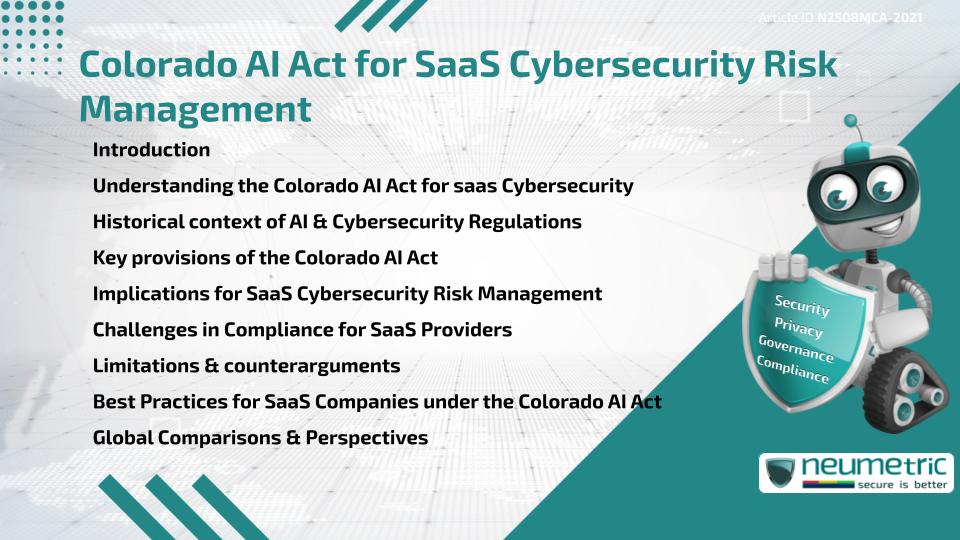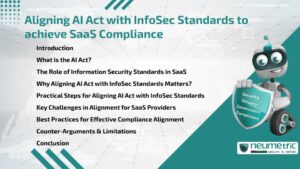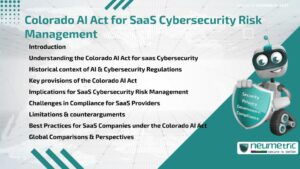Table of Contents
ToggleIntroduction
The Colorado AI Act for SaaS Cybersecurity is one of the first comprehensive state-level laws addressing Risks associated with Artificial Intelligence in Software & Cloud Services. This legislation emphasises Accountability, Transparency & Fairness in AI usage while requiring Organisations to assess Cybersecurity Risks tied to AI-driven Processes. For SaaS Providers, the Colorado AI Act introduces new Compliance obligations that extend beyond traditional Data Protection rules. It bridges the gap between AI innovation & responsible Cybersecurity practices, making it a landmark Regulation for Businesses using AI in SaaS Models.
Understanding the Colorado AI Act for SaaS Cybersecurity
The Colorado AI Act is designed to ensure that Artificial Intelligence Technologies used by Businesses are developed & deployed responsibly. Specifically for SaaS, this means scrutinising how AI Tools handle Sensitive Data, mitigate Risks of Bias & prevent Security Vulnerabilities.
Unlike traditional Privacy laws that focus on protecting Personal Data, this Act targets the accountability of AI-driven decision-making. It places a duty on SaaS Providers to evaluate Cybersecurity Risks not only in data handling but also in how AI algorithms operate.
Historical context of AI & Cybersecurity Regulations
AI Regulation in the United States has been fragmented, often relying on sector-specific rules or voluntary guidelines. Privacy frameworks like the California Consumer Privacy Act [CCPA] & Federal initiatives such as the National Institute of Standards & Technology [NIST] Cybersecurity frameworks laid a foundation, but none specifically addressed AI-related Cybersecurity Risks.
The Colorado AI Act marks a shift by explicitly binding AI use with Cybersecurity Compliance, signaling the beginning of more integrated legislation in this area.
Key provisions of the Colorado AI Act
The Act outlines several requirements that affect SaaS Providers:
- Risk Assessment: Organisations must conduct regular Risk Assessments for AI Systems to identify Vulnerabilities.
- Transparency obligations: Companies must disclose when AI is used in decision-making processes.
- Bias prevention: AI Systems must be monitored to reduce discriminatory outcomes.
- Accountability: Providers must maintain clear documentation of AI System design, training & deployment.
- Enforcement: Non-Compliance may result in Regulatory penalties & Reputational damage.
These provisions make it necessary for SaaS Providers to go beyond basic Cybersecurity measures & integrate AI-specific safeguards.
Implications for SaaS Cybersecurity Risk Management
For SaaS businesses, the Colorado AI Act for saas Cybersecurity requires a shift from traditional Data Protection approaches toward holistic AI Risk Management. This includes ensuring that algorithms are secure against Adversarial Attacks, Data pipelines are resilient to Breaches & decision-making processes remain explainable to Regulators & Users.
Additionally, SaaS Providers must demonstrate due diligence in both AI Development & Deployment stages, ensuring that Cybersecurity Risks are identified, reported & mitigated.
Challenges in Compliance for SaaS Providers
Implementing the Colorado AI Act brings several challenges:
- High costs associated with AI auditing & Compliance reporting.
- Technical difficulties in explaining complex AI Models (Black-box Systems).
- Balancing innovation with strict Regulatory requirements.
- Managing global operations where laws differ across jurisdictions.
For smaller SaaS Companies, these challenges can be particularly burdensome, creating pressure to invest heavily in Governance tools & Expert resources.
Limitations & counterarguments
Critics argue that the Colorado AI Act may slow down innovation by introducing heavy Compliance burdens. Others believe it may create inconsistencies across states if different regions adopt varying AI rules. On the other hand, supporters emphasise that the Act enhances Consumer Trust, strengthens Cybersecurity resilience & sets a Standard for ethical AI deployment in SaaS.
Best Practices for SaaS Companies under the Colorado AI Act
To meet obligations while maintaining innovation, SaaS Providers should:
- Conduct ongoing AI & Cybersecurity Risk Assessments.
- Adopt a Privacy-by-design & Ethics-by-design approach.
- Train staff in AI Governance & Compliance.
- Maintain transparent communication with Customers regarding AI use.
- Collaborate with Regulators & Industry peers to shape Best Practices.
Global Comparisons & Perspectives
The Colorado AI Act for SaaS Cybersecurity reflects a growing global trend in AI Regulation. The European Union’s proposed AI Act takes a Risk-based approach, while countries like Singapore & Canada emphasise responsible AI Frameworks. Compared to these, Colorado’s approach highlights a stronger link between AI Governance & Cybersecurity obligations, setting a precedent for other US states.
Takeaways
- The Colorado AI Act for SaaS Cybersecurity is a pioneering law combining AI Accountability with Cybersecurity Risk Management.
- SaaS Providers must comply with requirements for Transparency, Risk Assessment & Bias prevention.
- Compliance presents challenges but also builds Customer Trust & resilience.
- Global trends suggest more jurisdictions will adopt similar integrated Regulations.
- Best Practices include Risk Assessments, transparent Communication & Ethics-by-design principles.
FAQ
What is the Colorado AI Act?
It is a state-level law in Colorado that regulates the use of AI Systems, with a focus on Accountability, Transparency & Cybersecurity.
Why is the Colorado AI Act important for SaaS?
It directly links AI use in SaaS with Cybersecurity Compliance, making it vital for Providers to adopt stronger Governance & Risk Management.
How does it differ from Privacy Laws like GDPR or CCPA?
Privacy Laws focus on protecting Personal Data, while the Colorado AI Act emphasises AI Accountability & System-level Cybersecurity Risks.
What are the Penalties for Non-Compliance?
Non-Compliance can result in Regulatory fines, Enforcement actions & Reputational damage for SaaS Providers.
Does the Act apply only in Colorado?
Yes, it applies within Colorado’s jurisdiction, but SaaS Companies with customers in Colorado must comply, even if based elsewhere.
What are the key requirements for SaaS Providers?
Risk Assessments, transparency in AI use, prevention of bias & maintaining clear documentation of AI Systems.
How can SaaS Companies prepare effectively?
By adopting Privacy-by-design & ethics-by-design Models, training Staff & conducting regular AI Risk Assessments.
Need help for Security, Privacy, Governance & VAPT?
Neumetric provides organisations the necessary help to achieve their Cybersecurity, Compliance, Governance, Privacy, Certifications & Pentesting needs.
Organisations & Businesses, specifically those which provide SaaS & AI Solutions in the Fintech, BFSI & other regulated sectors, usually need a Cybersecurity Partner for meeting & maintaining the ongoing Security & Privacy needs & requirements of their Enterprise Clients & Privacy conscious Customers.
SOC 2, ISO 27001, ISO 42001, NIST, HIPAA, HECVAT, EU GDPR are some of the Frameworks that are served by Fusion – a SaaS, multimodular, multitenant, centralised, automated, Cybersecurity & Compliance Management system.
Neumetric also provides Expert Services for technical security which covers VAPT for Web Applications, APIs, iOS & Android Mobile Apps, Security Testing for AWS & other Cloud Environments & Cloud Infrastructure & other similar scopes.
Reach out to us by Email or filling out the Contact Form…





